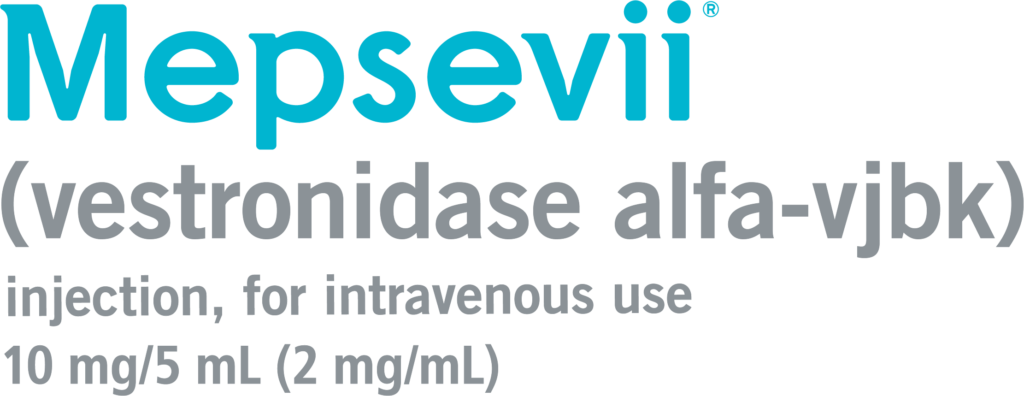Mucopolysaccharidoses, or MPS disorders, are caused by a deficiency in one of eleven unique lysosomal enzymes (Neufeld & Muenzer, 2014). Each enzyme deficiency affects the breakdown of large long-chain sugars called mucopolysaccharides or glycosaminoglycans, “GAGs” for short. Due to accumulation of GAGs in the lysosomes of cells, these disorders are included in a larger group of disorders known as lysosomal storage diseases or LSDs.
The MPS disorders include MPS I (Hurler, Scheie), MPS II (Hunter), MPS III (four subtypes: San Filippo A, B, C, or D), MPS IVA (Morquio A), MPS IVB (Morquio B), MPS VI (Maroteaux-Lamy), MPS VII (Sly), and MPS IX (hyaluronidase deficiency). Many of the signs and symptoms of MPS are very similar between types as the MPS disorders share a common pathophysiological mechanism, the accumulation of un-degraded GAGs in the lysosomes. Symptoms of MPS may include (Lehman, et al., 2011) (Clarke, et al., 2018): skeletal dysplasia, coarse facial features, pulmonary and cardiac symptoms, corneal clouding, hearing loss, joint stiffness or laxity, and dentition abnormalities.
MPS VII results from an enzyme deficiency in β-glucuronidase (GUS). MPS VII is an autosomal recessive disorder: a copy of a defective GUSB gene that encodes for the GUS enzyme is inherited from each parent. Due to the defect in GUS, GAGs accumulate in the cells leading to multi-systemic disease.
Symptoms of MPS VII may include enlarged spleen and liver, joint stiffness, short stature, and heart/ lung complications. MPS VII may present with a characteristic facial appearance and can lead to progressive skeletal dysplasia. MPS VII patients also can have presentation of cataracts, corneal clouding, hearing loss, developmental delay, and intellectual disability. MPS VII can present at birth with non-immune hydrops fetalis (NIHF) (Montaño, et al., 2016)(Gimovsky, et al. 2014). MPS VII is the most common MPS associated with LSD-based NIHF (Vianey-Saban, et al., 2016).

Testing plays a crucial role in the diagnosis and management of Mucopolysaccharidoses (MPS), a group of metabolic disorders. Early genetic testing can accurately identify the specific type of MPS, crucial for determining the appropriate treatment and management strategy. Enzyme assays complement genetic tests by measuring the activity levels of specific enzymes in blood or tissue samples, confirming the diagnosis. This combination of testing ensures timely and effective treatment interventions, significantly improving the quality of life for patients.
What is the Program?
Ultragenyx is partnering with Revvity Omics to offer sponsored, no-charge testing for MPS. This sponsored program uses dried blood spot punches to measure enzyme deficiency from an MPS enzyme panel and in cases of β-glucuronidase deficiency, GUSB gene sequencing is performed.
Patients suspected of having a MPS disorder

Ship DBS card, test requisition form, and consent form as soon as test strip is fully dried and ship to Revvity Omics.

Ultragenyx is a biopharmaceutical company committed to bringing novel products to patients for the treatment of serious rare and ultrarare genetic diseases. The company has built a diverse portfolio of approved therapies and product candidates aimed at addressing diseases with high unmet medical need and clear biology for treatment, for which there are typically no approved therapies treating the underlying disease.
The company is led by a management team experienced in the development and commercialization of rare disease therapeutics. Ultragenyx’s strategy is predicated upon time- and cost-efficient drug development, with the goal of delivering safe and effective therapies to patients with the utmost urgency.
For more information on Ultragenyx, please visit the company’s website at: www.ultragenyx.com.

MEPSEVII® (vestronidase alfa) is a recombinant human beta-glucuronidase enzyme replacement therapy developed by Ultragenyx Pharmaceutical Inc. for the treatment of mucopolysaccharidosis VII (MPS VII, also known as Sly syndrome). MPS VII is a rare, progressive genetic disorder characterized by the deficiency of the enzyme beta-glucuronidase, which leads to the accumulation of glycosaminoglycans (GAGs) in cells throughout the body, causing progressive damage in multiple organs. MEPSEVII is designed to replace the missing enzyme, helping to break down these GAGs and alleviate the symptoms of the disease. It is indicated for the treatment of non-neurological manifestations of MPS VII and has been approved in various regions including the U.S. and Europe.





